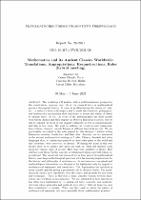| dc.date.accessioned | 2021-07-14T08:23:35Z | |
| dc.date.available | 2021-07-14T08:23:35Z | |
| dc.date.issued | 2021 | |
| dc.identifier.uri | http://publications.mfo.de/handle/mfo/3874 | |
| dc.description.abstract | The workshop analyzes the constitution, recovery, and role of the classical texts in mathematical practice throughout history. It aims at problematizing the notion of "classic", to make it a historical category and to study the rhetorical, pedagogical, and institutional mechanisms that contribute to secure the status of classic to specific texts. So far, the focus of the historiography has dealt mostly with Greek classics and their impact on Western European societies. We aim to expand the focus of our enquiry culturally and chronologically in two ways. We want to address the reception and transformation of these "classics" outside Europe in different historical periods. We are particularly interested in the roles played by this classical tradition within Islamicate societies, South-East and East Asia. Secondly, we are interested in the ancient mathematical writings in Arabic, Chinese, Sanskrit and other languages that, at certain time periods in these other parts of the world and elsewhere, were perceived as classics. Widening the focus should allow us to inquire into questions such as: what did classical texts mean for various types of actors? How were they available to them? How did they read them? In the contexts of which institutions and with which expectations? The important role classical works have played in mathematical history pose deep methodological questions with far-reaching implications for the history and philosophy of mathematics. In mathematics conceptual and methodological innovations are thought to be legitimized only by appeal to mathematical arguments and consistency. Yet, legitimation has involved in many crucial episodes giving a prominent role to classical works. The mathematical classics have repeatedly been the source and grounds for new ideas and techniques. There is therefore a deep, complex tension between innovation and tradition. We are interested in how innovation has often been legitimized by re-reading old texts, concepts, and methods-old texts whose principles and methods were utterly different from the ones they contributed to sustain. What can this teach us about the nature of mathematical argument, and mathematical practice? | |
| dc.title | Mathematics and its Ancient Classics Worldwide: Translations, Appropriations, Reconstructions, Roles (hybrid meeting) | |
| dc.rights.license | Dieses Dokument darf im Rahmen von § 53 UrhG zum eigenen Gebrauch kostenfrei heruntergeladen, gelesen, gespeichert und ausgedruckt, aber nicht im Internet bereitgestellt oder an Außenstehende weitergegeben werden. | de |
| dc.rights.license | This document may be downloaded, read, stored and printed for your own use within the limits of § 53 UrhG but it may not be distributed via the internet or passed on to external parties. | en |
| dc.identifier.doi | 10.14760/OWR-2021-26 | |
| local.series.id | OWR-2021-26 | |
| local.subject.msc | 01 | |
| local.date-range | 30 May - 05 Jun 2021 | |
| local.workshopcode | 2122 | |
| local.workshoptitle | Mathematics and its Ancient Classics Worldwide: Translations, Appropriations, Reconstructions, Roles (hybrid meeting) | |
| local.organizers | Karine Chemla, Paris; Vincenzo De Risi, Berlin; Antoni Malet, Barcelona | |
| local.report-name | Workshop Report 2021,26 | |
| local.opc-photo-id | 2122 | |
| local.publishers-doi | 10.4171/OWR/2021/26 | |

